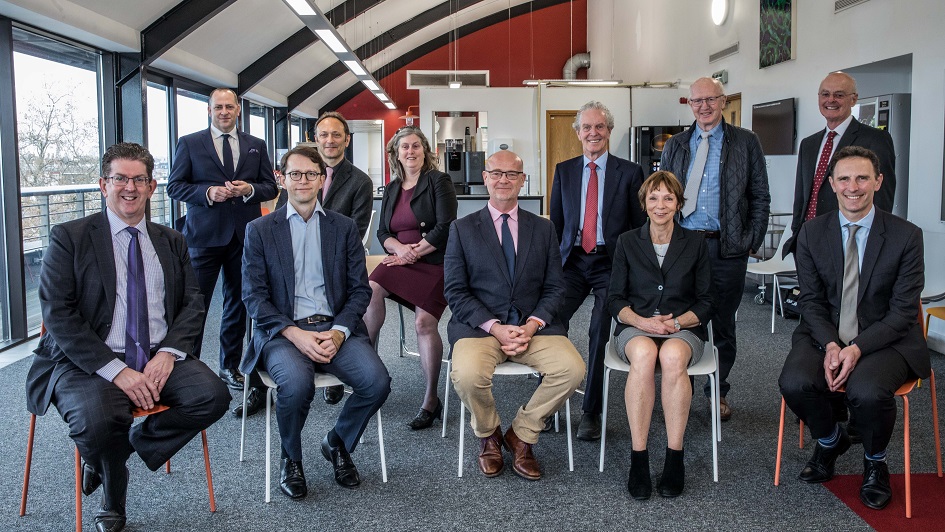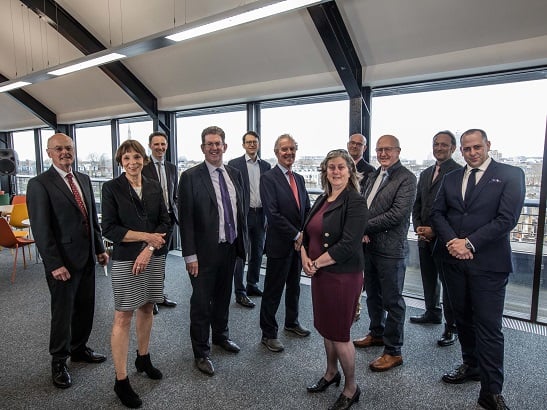
Image: Picture of the winning team from the ICR and The Royal Marsden (Credit: soora.co.uk)
A group of UK clinical and non-clinical scientists working together across different areas of cancer research has won one of the world’s most prestigious team science awards for work that has transformed treatment for many patients with breast cancer.
The researchers at The Institute of Cancer Research, London, and The Royal Marsden NHS Foundation Trust today (Wednesday) were named winners of the Team Science Award from the American Association for Cancer Research (AACR).
Seminal discoveries to improve diagnosis and treatment
The AACR recognised the team’s “seminal translational discoveries in breast cancer research that have led to significant improvements in diagnosis and treatment”. They noted that the team “has led the discovery of new therapeutic approaches and the biomarkers that identify the populations of patients that gain most benefit from them”.
The team was recognised for achievements that include:
- The discovery of new therapeutic approaches, such as PARP inhibitors, that have changed how patients with BRCA1 and BRCA2 mutant breast cancers are tested and treated
- Discoveries that have led to improvements in how oestrogen receptor positive (ER+) breast cancers are treated
- Discoveries of ways to test, using predictive biomarkers, that have informed which treatments are selected, how they can be de-escalated or adapted according to evidence of response or resistance
- Leading work that has fundamentally changed international guidelines for the number of radiotherapy doses used that reduces the length of the course of treatment
- The discovery of molecular changes in breast cancer that cause metastatic colonisation, resistance to cell death but also vulnerability to targeted therapy
The bench-to-bedside team is made up of researchers and clinicians from the Breast Cancer Now Toby Robins Research Centre at The Institute of Cancer Research (ICR), the Breast Unit at The Royal Marsden, The Ralph Lauren Centre for Breast Cancer Research at The Royal Marsden, and the Cancer Research UK-funded Clinical Trials and Statistics Unit at the ICR.
Find out more about the research discoveries recognised by the AACR Team Science Award.
Read our feature on the science behind the award
Bringing together expertise in large teams
The team has made major contributions to the development of PARP inhibitors and platinum chemotherapy for genetic forms of breast cancer, played a leading role in the clinical development of aromatase inhibitors for ER+ breast cancer, generated the clinical evidence to justify using liquid biopsies to direct treatment and demonstrated how patients can be treated with fewer radiotherapy doses and identified a group who can do well without chemotherapy.
It has also developed new ways to study advanced breast cancer using metastasis models in mice – improving our understanding of how breast cancer spreads and how we might treat that spread – advanced our knowledge of how breast cancer can resist cell death, and found new ways to make the disease vulnerable to targeted treatments.
Much of the ICR research cited in the award, which has rarely been awarded to teams based outside the US, was funded by UK charities: Breast Cancer Now and Cancer Research UK. The Royal Marsden’s research was supported by The Royal Marsden Cancer Charity and the National Institute for Health Research Biomedical Research Centre at The Royal Marsden and the ICR.
Progress in breast cancer research at the ICR and The Royal Marsden has its foundations in bringing expertise together from many academic research areas, spanning laboratory bench to hospital bedside, and back again, and forming large multidisciplinary teams.
Our scientists have been involved in some of the most important discoveries in research to improve the diagnosis and treatment of breast cancer.
Find out more about our breast cancer research
Recognising interdisciplinary research
The AACR and Eli Lilly and Company established the Team Science Award in 2007 to acknowledge and catalyse the growing importance of interdisciplinary teams to the understanding of cancer and the translation of research discoveries into clinical cancer applications.
The award recognises an outstanding interdisciplinary research team for innovative science that may have advanced our fundamental knowledge of cancer, or for applying existing knowledge to advancing the detection, diagnosis, prevention or treatment of cancer.
The recognition comes 10 years after a joint team from the ICR and The Royal Marsden first won the award in 2012, which was the first time the award had gone to a team outside the US.
Making a difference in treating breast cancer
Professor Andrew Tutt, Head of the Division of Breast Cancer Research at The Institute of Cancer Research, London, and the Award Team Leader, said:
“It is a really great honour to receive this award from the AACR and we’re so grateful to receive it. It’s an endorsement of our strong, collaborative approach, where laboratory scientists and clinical academics work closely across the ICR and The Royal Marsden to understand the needs of patients, make discoveries to address them in the lab and turn them into improvements in treatment in the clinic through clinical trials research.
“It’s been hugely motivating over the years to see how our progress, working with colleagues in the US and around the world, has made such a difference in treating breast cancer. We’re proud to be recognised like this and we will continue to build on this work so even more patients can benefit in the future.”
Professor Stephen Johnston, Head of the The Breast Unit at The Royal Marsden NHS Foundation Trust, said:
“We are delighted that two global clinical trials in early breast cancer led by The Royal Marsden and ICR team have recently resulted in newly approved targeted treatments that are set to improve outcomes for breast cancer worldwide. Both trials represent a culmination of many years of scientific and clinical research by the team into understanding breast cancer biology, together with partnership collaborations that develop new therapies to evaluate in clinical trials. The close working relationship between our scientists and clinicians facilitates this effort and allows advances from basic research to reach patients quickly. By targeting the right treatment to the right patient at the right time we will ultimately deliver better and more effective care.”
Our researchers regularly present their latest findings at the AACR Annual Meeting in the US.
Find out more about the AACR conference
Many teams behind the discoveries
Professor Judith Bliss, Director of the Clinical Trials and Statistics Unit at The Institute of Cancer Research, London, said:
“The close collaboration that goes on between breast cancer researchers working at the ICR and The Royal Marsden has been incredibly productive in making discoveries that are translated into improving the lives of patients. There are teams behind the individuals within the team recognised here – it takes a lot of people to make a difference. It’s fantastic to be recognised for the teamwork that’s so central to how we work.”
Professor Kristian Helin, Chief Executive of The Institute of Cancer Research, London, said:
“We’re so proud of this fantastic team for all that they’ve achieved for women with breast cancer. It’s testament to great teamwork between scientists and clinicians and the amazing partnership we have between the ICR and The Royal Marsden.
“These days it’s rare for major discoveries to be made by lone scientists working in isolation – if you want to make transformational discoveries in medicine you really need to be working together as multidisciplinary teams towards a common goal.”
Speeding up progress to benefit patients worldwide
Professor David Cunningham, Director of Clinical Research at The Royal Marsden NHS Foundation Trust, said:
“The Team Science Award is credit to the outstanding innovative work undertaken by The Royal Marsden and the ICR for the benefit of not only Royal Marsden cancer patients but worldwide. Our collaborative work speeds up translational work to ensure cancer patients receive the most effective targeted treatments, offering more promising outcomes.”
The members of the winning team are Professor Alan Ashworth, Professor Judith Bliss, Professor Mitch Dowsett, Professor Clare Isacke, Professor Stephen Johnston, Professor Chris Lord, Professor Pascal Meier, Dr Alistair Ring, Professor Ian Smith, Professor Nick Turner, Professor Andrew Tutt, and Professor John Yarnold.
The prize will be presented during the opening ceremony of the AACR Annual Meeting 2022 on Sunday 10 April in New Orleans, US.
